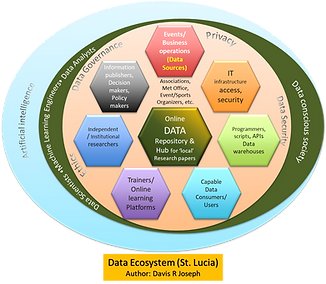

Assessing your readiness
Signs that your data practices need upgrading
-
Your monthly Excel reports are stored in separate workbooks, making it difficult to efficiently aggregate data for monthly comparisons or year-to-date summaries. .
-
You are collecting data but have not prepared documentation on the rationale for collecting the data, or specified the various data sources or provided steps to for standardized data processing. You rely on fragmented communication for guidance; such as emails, meeting minutes or even employee memory.
-
Data entry and processing are deferred until reporting periods rather than being captured at the point of transaction, increasing inefficiencies and making the task burdensome.
-
You do not have a centralized data respository for the data generated by your various platforms.
Some of the tools that might be employed to achieve your data goals
-
Power BI is a business analytics tool developed by Microsoft that enables you to visualize your data and share insights across the organization, or embed them in apps or websites. it connects to a wide range of data sources to help turn raw data into interactive dashboards and reports.
-
Tableau - a powerful and widely used business intelligence and data visualization tool. Ideal for analyzing large dataset and transforms raw data into interactive, insightful, and visually appealing dashboards and reports. It integrates well with Excel and Google Sheets.
-
Airtable - A cloud-based platform that can most simply be described as an intuitive spreadsheet-database hybrid .
Evidence of a strong data-driven business and community
-
Data governance policies will be common among businesses. These will define how a business collects, manages, protects, and uses data across the organization for effective decision-making.
-
Data conscious leadership will be the norm rather than the exception.
-
St Lucians will have access to Data Repositories (publicly available datasets) for analysis and research. Datasets on sports, entertainment - carnival events...
-
A culture of publishing data leads to a scholarly sharing and peer-review hub - a centralized portal where research on local challenges, opportunities and trends is shared.
-
A clear AI adoption road map fostered by a data-oriented culture exists -- promoted heavily by umbrella organizations.
-
Data Analysts are key members of your team.
What is a data ecosystem
A data ecosystem is a dynamic network of people, technologies, processes, and institutions that collect, manage, share, analyze, and use data to create value.
About the St. Lucia Data Ecosystem Model
This Data Ecosystem model, created by Davis R. Joseph, offers a structured view of how data can drive national development, responsible innovation, and the ethical use of Artificial Intelligence in St. Lucia. At the center is an Online Data Repository & Research Hub, envisioned as a local engine for collaboration, insight sharing, and research.
Surrounding this core are key, interdependent components of the ecosystem:
-
Events & Business Operations – Real-world activities that generate valuable local data.
-
IT Infrastructure & Security – Systems that ensure secure, reliable access to information.
-
Programmers, APIs & Warehouses – Technical enablers of data storage, movement, and automation.
-
Trainers & Learning Platforms – Building data literacy and analytics capacity across sectors.
-
Researchers & Institutions – Contributors of evidence-based insights and deep analysis.
-
Policy Makers & Publishers – Users who turn data into decisions, policy, and public resources.
-
Capable Data Consumers – Citizens, businesses, and organizations applying data for informed action.
Critically, this model encourages us to assess the current health of each component. It reminds us that a data ecosystem is only as strong as its weakest part. Understanding where we are now—where gaps exist in infrastructure, access, skills, or policy—is essential to making progress. We must acknowledge these dependencies and focus attention where it’s needed most.
The outer layers reflect broader values—Data Governance, Ethics, Privacy, and Security—framing the ecosystem within a Data-Conscious Society. Importantly, the model is linked to Artificial Intelligence, signaling the need for a robust data foundation to support intelligent systems, innovation, and national resilience.
This ecosystem isn’t just a diagram—it’s a roadmap for reflection, strategic investment, and sustainable development in the age of AI.




